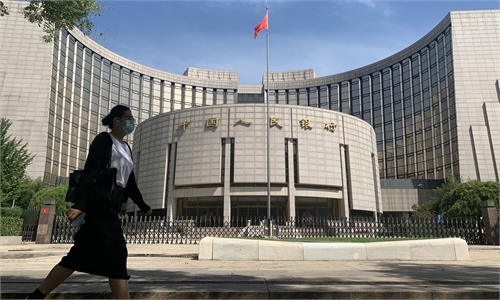;
Confidence in the stock market will boost and support overall confidence in the Chinese economy
Bearing the impact of the three-year COVID pandemic, the Chinese economy still faced lingering side-effects of it in 2023, with the pandemic's scarring effect severely weakened market confidence. During the meeting of the Political Bureau of the Communist Party of China (CPC) Central Committee held in late July last year, the policymakers emphasized that the country's economic recovery was undergoing "wave-like" development.
Looking back, the market's expectations at the end of 2022 were overly optimistic. China set a GDP growth target of about 5 percent in early 2023, which was a more rational and reasonable approach. The Chinese economy successfully surpassed that target.
China's GDP growth rate has continued to increase despite the global economic downturn. While the global economy is expected to experience a slowdown last year to 3.0 growth, compared with 3.5 percent in 2022, China's growth rate increased from 3 percent in 2022 to 5.2 percent in 2023. This was a remarkable achievement that required overcoming external pressures and internal challenges.
China's economic growth rate remains relatively higher than other countries like the US. And, China is not the only country facing a slowdown in growth - lower than pre-pandemic levels.
Despite the global economic slump, China is still able to achieve a moderate to high growth rate of about 5 percent, which plays an important role in stabilizing the global economy. China's contribution to global economic growth last year was still about 30 percent, demonstrating that China remains an important driving force of the global growth.
China has aimed to actively cultivate new growth drivers through technological innovation, green development and data-enabled transformation. Despite the overall decline in exports last year, exports of the "New Three Items" grew rapidly, exceeding the 1 trillion yuan ($140 billion) mark.
China has achieved similar growth in other fields. From an industrial perspective, the value-added growth rate of high-tech industries is eye-catching. From an investment perspective, the investment growth rate in the high-tech manufacturing and services industries was higher than that in fixed-asset investment. Additionally, China has achieved international competitive advantages in many industrial fields, such as in green and renewable energies.
In 2024, the Chinese economy will benefit from several favorable conditions. First, with the further weakening of the pandemic impacts, China can expect economic and social activities to return to a normal level. This will stimulate continued growth in consumption and investment, and contribute to expanding the scale of the economy.
Second, the implementation of fiscal and monetary stimulus policies will continue to provide the necessary support for stabilizing economic growth and promoting the recovery. The Central Economic Work Conference made it clear that macroeconomic regulation will be intensified.
Third, China's plan to implement reform and opening-up measures in key areas will inject new vitality into economic growth. Technological innovation and the next industrial revolution will become new driving forces for economic development.
If China follows the deployment of decisions by the Central Economic Work Conference, promotes high-quality development and intensifies structural adjustments while maintaining necessary policy support, there will be positive momentum for the economic recovery.
However, China should also recognize that the complexity, severity and uncertainty of the external environment in 2024 still exist. From a positive perspective, the US Federal Reserve's interest rate hikes are nearing an end and there is the possibility of rate cuts, which will expand the space for China's macroeconomic policies and encourage European and US companies to replenish their inventories, improving overseas demand for Chinese goods.
In addition, ongoing high-level exchanges and dialogue between China and the US will help control their tensions.
However, China should be aware of the economic uncertainties, especially in the late stage of the US Federal Reserve's tightening cycle. Insufficient tightening may lead to the Fed reconsidering rate hikes, while excessive tightening may cause a hard landing for the US economy.
According to the World Trade Organization's forecast in October 2023, global merchandise trade growth may recover from 0.8 percent in 2023 to more than 3 percent in 2024. Therefore, China expects its foreign trade exports will likely recover and grow in 2024.
China experienced fluctuations in foreign enterprises' investment in 2023. However, fluctuations in foreign investment are normal, not only in China but also in other countries, including the US.
Since total global foreign direct investment fell from 2020 to 2022, while China's attractiveness to foreign investment continued to steadily increase, it was not surprising to see some adjustments in scale in 2023.
In addition, the impact of non-economic factors in reshaping global industrial and supply chains may have some influence on China's utilization of foreign investment.
China is still a growing economy with a colossal market, so it still has an appeal to foreign investment. With the normalization of communication and exchanges with the outside world, investors are paying more and more attention to China's market, and confidence in China's economic fundamentals keeps on recovering.
By Guan Tao
The author is global chief economist at BOC International under Bank of China. bizopinion@globaltimes.com.cn
Related:
China injects $140b into market, in major policy package to boost economy
 Chinese authorities vow stronger measures to bolster stock market, with sufficient policies in toolkit
Chinese authorities vow stronger measures to bolster stock market, with sufficient policies in toolkit
 Chinese authorities vow stronger measures to bolster stock market, with sufficient policies in toolkit
Chinese authorities vow stronger measures to bolster stock market, with sufficient policies in toolkitChina's benchmark Shanghai Composite Index posted a V-shaped rebound on Wednesday after the securities regulator vowed to strengthen investor protection and oversight of listed companies. Analysts said that Chinese authorities have the confidence and resolve to maintain the healthy and steady development of the country's financial sector, with sufficient policies ...
Chinese policymakers on Wednesday issued a package of major policies to boost the country's economy, including cutting the amount of cash that banks are required to hold as reserves to inject nearly $140 billion into the economy and lowering refinancing and rediscount rates, signaling that China is stepping up efforts to ensure stable economic recovery in 2024.
By Wang Cong, Feng Fan and Qi Xijia | 2024/1/24 20:55:35
Related posts:









